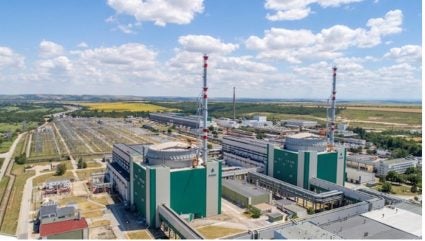
An engineering contract for the construction of new capacity at the Kozloduy NPP has been signed at Bulgaria’s Council of Ministers by project company Kozloduy NPP New Build and the Westinghouse-Hyundai Engineering & Construction (E&C) consortium. The contract was signed by Executive Director of Kozloduy NPP New Build Petyo Ivanov, Senior Vice President of Westinghouse Energy Systems Elias Gedeon, and Hyundai E&C President & CEO Yoon Young-Joon.
Also attending the ceremony were Ji I Cho, Deputy Head of Mission and Charge d’Affaires at the South Korean Embassy; Bulgarian Acting Energy Minister Vladimir Malinov; Bulgarian Prime Minister Dimitar Glavchev; and US Ambassador to Bulgaria Kenneth Merten.
In February, Bulgaria and the US signed a formal agreement to collaborate on the construction of Kozloduy units 7&8. While the units are to have Westinghouse AP1000 reactors, Westinghouse will not take part in the construction but will retain overall control of the project. South Korea’s Hyundai E&C was shortlisted for the EPC contract.
Currently, Kozloduy NPP operates two Soviet-built VVER-1000 reactors (units 5&6). Bulgaria was obliged to close four older VVER-440 units as a condition for accession to the European Union, even though the units had undergone significant safety upgrades. According to the schedule, Kozloduy unit 7 should be operational in 2035 followed by unit 8 two years later. However, it seems that this schedule may now have to be revised.
At the end of October, Kozloduy NPP New Build and Westinghouse signed an extension to a Front-End Engineering & Design (FEED) contract for the construction of Kozloduy 7&8. The FEED contract to explore the possibilities of building a new reactor using American technology was signed in June 2023. According to the schedule adopted by Bulgaria’s National Assembly, its completion was expected in June this year. This deadline was not met making necessary the continuation of the contract.
Following the signing of the engineering contract, Yoon Young-Joon said Kozloduy NPP will play an important role in enhancing Bulgaria’s nuclear security. He added that Hyundai is a driving force in South Korea’s economic development and the only company to have successfully completed 24 nuclear projects on time and within budget since 1971. “A job well started is half done,” he said, quoting a Korean proverb. “To achieve success, we all need to work together as a team,” he noted.
Prime Minister Glavchev said Bulgaria has over 50 years of experience in building nuclear facilities, dating back to the establishment of the Kozloduy NPP. “The signing of the contract will see the realisation of a project that builds on Bulgaria’s expertise in this field and will contribute to the independence, diversification, and stability of nuclear energy in Bulgaria and throughout Southeastern Europe. We are convinced this is the right path.” Noting that Westinghouse and Hyundai are “undisputed leaders in this field” he added: “We prefer to work with such investors who are absolutely transparent and clear, with proven international experience.”
Kozloduy NPP New Power Executive Director Ivanov said: “The engineering contract will assess capital and operating costs. These data will be used to assess which scenario is best for the future development of the project. In addition, they will give an idea of the price of the electricity produced.” The engineering project will cost $350-370m.
Energy Minister Malinov noted that, in the next 12 months, an accurate schedule will be prepared for the construction of the two new units at Kozloduy NPP as well as an accurate account of the value of the whole project. After this deadline, the Energy Minister must submit a report to the National Assembly and it must take a final investment decision. Malinov described the project for the new nuclear facilities in Kozloduy as “irreversible” and said that it could be implemented in less than 10 years.
Malinov, the previous day, had told journalists that the engineering contract would provide, “a precise schedule, a fixed price for the implementation of the project, predictability at what price the new capacities will produce energy and whether it will be profitable and affordable for the Bulgarian society and for the whole region”. In September, Malinov had announced that funding would be provided for the construction by the Korean Export Bank. An agreement was also signed with the US Exim Bank to guarantee €8bn ($8.7bn) in lending. However, currently only unit 7 has a completed conceptual design enabling it to lobby for financing from potential investors. Unit 8 is not at this stage and has not even passed the Environmental Impact Assessment procedure.
Asked what was happening with the sale to Ukraine of equipment from the cancelled Belene NPP, Malinov said these revenues would be used to implement Kozloduy 7&8. He said he had discussed the issue with Ukrainian Minister of Energy two weeks before during a meeting in Paris.
The Belene project had envisaged the construction of two Russian VVER-1000/V-466 reactors and preliminary site works began in 2008 but the project was cancelled in 2012, after a change of government. It was revived again briefly in 2018 after a series of arbitration procedures, which saw Bulgaria pay €601.6m ($691.5m) in compensation to Atomstroyexport for the equipment already manufactured. These components are now stored at the construction site. Ukraine is now seeking to purchase them for use at its Khmelnitsky NPP.
Malinov said the National Electricity Company and the Bulgarian Energy Holding had sent the final proposal to the Ukrainian side on 16 October. The Ukrainian Minister of Energy told Malinov during their meeting in Paris that Ukraine would need about a month to finally secure funding for the implementation of the deal. Ukraine’s parliament will then have to approve it. “The only two conditions that need to be agreed are the price of the deal, which should not be lower than that set by the National Assembly, and the conditions for payment,” Malinov added.






